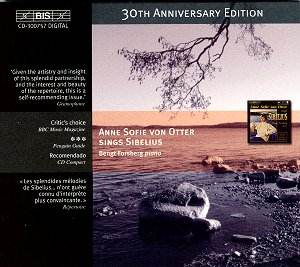If
the idea of Sibelius songs seems to conjure up images of attenuated,
magical atmospheres and snow-clad beauty, you will be brought
up short by the drama and passion of the op. 13 songs, Sibeliusís
first published collection (1892). This mood continues for much
of the disc, for the performers believe in living dangerously
and present a Sibelius closer to expressionism than to impressionism.
Itís a pretty enthralling experience.
Some
time ago I was loud in my praise of Katerina Karnéusís
Hyperion selection of Sibeliusís songs, which also includes
op. 50 and two of the op. 13 pieces. So am I changing allegiance?
No, after careful comparison I find the two complementary and
would not part with either. They both have equally beautiful voices,
but, although they are both mezzos, they are quite different;
von Otterís voice is like a thread of pure gold while that of
Karnéus is much darker with a rich velvety timbre. Both
find a manner of interpretation suited to their vocal characteristics.
Karnéus adopts a more bel canto style (while not
unappreciative of the words). She and her rich-toned pianist emphasise
the Straussian warmth of the writing. In Lenzgesang, the
first of the op. 50 set, she opts for a key a tone above von Otter,
allowing her voice to ring out thrillingly. Von Otterís lower
key allows her to enjoy a nice descent to the chest voice at "erwacht"
at the end of the 4th line, but above all it allows her a more
relaxed, almost conversational delivery which uncovers much detail.
Itís a more word oriented approach and more recently, in her Offenbach
recital, I felt she was getting mannered, but not here.
Interestingly,
in "Spring flies speedily", from the op. 13 songs, it
is von Otter who adopts the higher key, giving what almost seems
a soprano interpretation, with a sumptuous high G, while Karnéus,
a minor third lower, finds a dark melancholy in the piece. In
four of the songs they both choose the same key, yet the essential
difference of approach remains.
Each
has the right pianist. Bengt Forsberg aims to get the maximum
of colouristic gradation from Sibeliusís often remarkable accompaniments,
which range from extreme spareness to extreme elaboration, though
in "Nordern", the first of the op. 90 songs, he tries
to get too much out of the chordal accompaniment and nearly drowns
the singer. Julius Drake, for Karnéus, produces a consistent
warmth of tone.
If
you want to have just one disc of Sibelius songs, then perhaps
the Karnéus offers the most balanced programme. The von
Otter record is part of Bisís complete Sibelius project (which
includes another CD by von Otter) so does not intend to offer
an overall view of his song production, though the programme is
varied and interesting. But, if you think you want just one disc
of Sibelius songs, either of these is likely to convince you that
one is not enough, so why not get both?
Christopher
Howell
